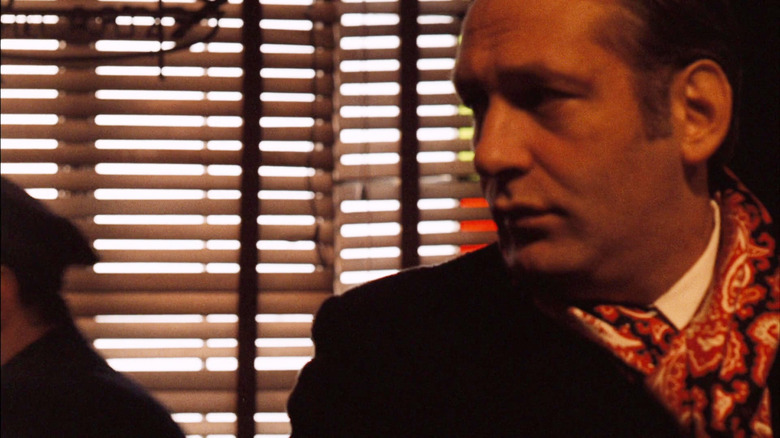Why The Oscars Banned The Godfather Actor Carmine Caridi
Back in 2022, Will Smith got up on stage during the Oscars telecast to slap host Chris Rock for making a joke about his wife's hair. "Keep my wife's name out of your f***ing mouth" he yelled. Smith, it should be noted, also won the Oscar for Best Actor that night. Almost immediately, however, pundits took to their keyboards to discuss the consequences for Smith, weighing in on any possible punishments or exoneration of his brash behavior. Smith, some might say wisely, resigned from the Motion Picture Academy of his own volition and was subsequently banned from the Academy Awards for 10 years. By late 2024, this all seemed like a tempest in a teapot.
But Smith's resignation from the Academy brought up a few interesting pieces of trivia about Hollywood, notably that the Academy has only very, very rarely expelled its members. Indeed, as noted by the Independent, only the most grievous criminals have actually been kicked out. Harvey Weinstein, for example, was given the boot in 2017 after the news broke of his many sexual crimes, followed by Bill Cosby and Roman Polanski in 2018 for the same reason. Cinematographer Adam Kimmel was also expelled in 2021 when the Academy learned he was a registered sex offender.
The first person to be booted from the Academy, however, was no criminal. Indeed, his "crimes" against the Academy seem so piddling and quotidian that one might wonder why the motion picture body targeted him. Back in 2004, actor Carmine Caridi, who played Carmine Rosato in "The Godfather Part II" and Albert Volpe in "The Godfather Part III," was expelled from the Academy for, of all things, sending copies of his VHS Academy screeners to a friend.
The scandal that got Caridi expelled
The actor, it should be pointed out, wasn't exactly running a full-blown bootlegging operation. Caridi merely gave his screeners to his Illinois-based friend Russell Sprague, himself not an Academy member who then copied the videos and put them on the internet. Recall that copying commercial VHS cassettes is a federal crime, so it wasn't long before the FBI came sniffing around. Sprague got in trouble with the law, and the FBI traced his screeners back to Caridi. The scandal attracted lawsuits from Columbia Pictures and Warner Bros, and that was enough to get Caridi expelled from the Academy. This also made him the first person in the body's history to be kicked out.
To offer some insider context: every year, usually in mid-November, major studios mail physical copies of their biggest movies to critic groups, awards bodies, and Academy members all around the country. The tapes/discs are the best means to ensure that Academy voters can see certain movies before voting deadlines. It's a great way for studios to campaign, and the screeners offer voters a great way to catch up on anything they might have missed.
The screeners, however, are strictly watermarked and all come emblazoned with on-screen warnings about how they are not to be copied, shared, or redistributed. In some cases, the name or email address of the recipient is also part of the watermark, especially when it comes to online screeners. A responsible voter is supposed to watch the discs they need to and then throw them away.
In 2004, Caridi was merrily passing on his VHS screeners, some 60 movies' worth, flouting the studio's secrecy requests. It may have been a federal crime, but more so it was a break in the Academy's propriety. Caridi continued to act until his death in 2019, but he was never allowed to vote for the Oscars again and was banned from the ceremonies in perpetuity.
Comparing Caridi's crimes to those of Weinstein, Cosby, or Polanski, of course, seems wholly unfair. Caridi was no monster. But when the FBI gets involved, the Academy couldn't hand-wave his mild violations away.

